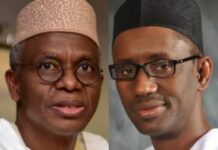Former Military Head of State, Ibrahim Babangida, popularly known as IBB, attempted to rewrite history last week, and he partly succeeded, going by the applause he got after addressing a gathering of elites in Nigeria at the launch of his memoir titled: ‘A Journey Of Service’ in Abuja.
On that day, he told Nigerians the stale news that the Presidential Candidate of the now defunct Social Democratic Party (SDP), in the June 12, 1993, presidential election, Chief MKO Abiola, won the election, but that it was the third person in command, the now late General Sani Abacha and others that annulled the election, which eventually set the country on a downward slope towards disintegration.
He, as the Commander-in-chief, was blameless, as he told Nigerians that he, alongside the then newly elected president, Abiola, would have been killed.
With that alone, Babangida tried to rewrite history with a narrative that is hard to believe. Again, IBB, with the book launch, succeeded in demystifying the popular notion of him as a tough soldier.
The Yorubas have a saying that ‘Ibi lile laanba Omo’kunrin’ (A man should not be afraid to face challenges), especially not a Soldier. But for Babangida to openly admit that he was afraid of the possibility of been killed by Abacha, shows that some of our military leaders are men without balls. (Pardon my French). A General afraid of death?
Indeed, IBB came out at the end of the day as a military General who was more afraid of his colleagues than upholding and doing what is right for the nation.
This is the same Babangida that quelled the Dimka coup in 1976, engineered the overthrow of the Shehu Shagari administration in 1983, enthroned Muhammadu Buhari as Head of State, and in 1985, staged another coup against the same Buhari to take over power.
Babangida as a military dictator executed his close friend and best man at his wedding, Mamman Vatsa, for allegedly planning a coup, executed Gideon Okar and scores of others after a failed coup, locked up 13 political godfathers, including his boss, Major General Shehu Musa Yar’Adua, for hijacking NRC and SDP primaries, but failed to act when anti-June 12 forces truncated the transition to civil rule, which has cost the nation several millions of naira, all because he was “afraid for his life”.
At the launch of his memoir in Abuja, IBB came out as a lily-livered military general who was more concerned about leaving power with his life than a man ready to uphold, defend and protect the constitution that he swore to uphold.
A memoir is a narrative, written from the perspective of the author, about an important part of their life, and it is not so surprising that the annulment of the June 12, 1993 presidential election took a greater portion of the book. However, the perspective he tried to paint on the June 12 election annulment is false.
Let me confess that I have not read the book, but from the snippets of the review done by former Vice President, Yemi Osinbajo, Babangida devoted a large portion of the book on the June 12 election and its aftermath, where he described the annulment of the election as an ‘accident of history’. Although, he claimed responsibility for the annulled election and pleaded for forgiveness, the ‘evil genius’, as he was popular known, insisted that the forces in the military overwhelmed him and he capitulated.
“We completely underestimated the deep opposition to civil rule within the military top hierarchy. We underestimated the damage that the extended stay in the political arena, with all its perks, had done to the military psyche and the psychological shock that would accompany an eventual withdrawal from much temptingly appealing political positions. We further underestimated what it would take to return the military to the barracks and its non-political and non-partisan role.”
In other words, Babangida and his band of military adventurists in politics had tasted honey and were simply not willing to let go. With power came the sweet aroma and taste of something too tempting to ignore, and it was not only Abacha that was against the return to democratic rule. Babangida himself was not willing to let go of power. Power corrupts and absolute power corrupts absolutely. Most of the Soldier boys in power in the 70s and 80s in Nigeria were young men in their 30s and 40s who hijacked power for their selfish reasons. They got to power and did not know what to do with it. They became intoxicated with it, setting back the country’s development for several decades. Till today, Nigeria is still battling with the effect of their coups and counter-coups.
If Babangida had insisted on going ahead with the transition programme, the possibility of Abacha and those against democratic rule may have attempted to take him out if he handed over power to Abiola, but telling Nigerians that MKO would have also been eliminated was wrong. He has no right to play God. He was not in a position to determine what would have happened. Perhaps, his friends in the military, particularly Abacha, that he left behind, could have attempted a coup, but only God knows how it would have panned out.
Again, many of the dramatis-personnel in the June 12 debacle are all dead and no longer around to defend themselves or to give account of what actually happened behind closed doors. From Sani Abacha (whom he said led the anti-June 12 forces), to Augustus Aikhomu (who directed his press secretary, Nduka Irabor, to announce June 12 annulment without IBB’s knowledge), to Arthur Nzeribe (whose unregistered ‘Association for Better Nigeria’ secured a court order to stop the election), to Justice Dahiru Saleh (who annulled the election), to Attorney-General of the Federation, Clement Akpambo (who insisted that the illegal order must be respected) – all are dead, and no longer around to defend themselves.
Babangida had a golden opportunity to turn this country around for the better. During his reign, the country was awash in petrol dollars as it was during the Yakubu Gowon era. The Gulf war ensured that the price of crude oil was never below 100 dollars per barrel. But he wasted billions on an endless transition to civil rule. He started the shenanigans when he established and funded the two political parties for the country, the National Republican Convention (NRC), and the Social Democratic Party (SDP). He then went ahead to build party secretariats for his two babies across the 774 local government councils and directed Nigerians to join any of their choice. He believed rightly or wrongly, that it was not the business of politicians to fund political parties as money bags amongst them would hijack such parties.
Babangida banned and unbanned politicians, fixed dates for return to civilian rule and later changed his mind, and shifted the goal posts, all in a bid to extend his tenure and remain in power. It was not surprising when he was given another nickname as a result – Maradona, after the soccer legend, Diego Maradona, who was well-known for his dexterity on the football pitch. For eight years, Babangida turned Nigeria into his football playing pitch, dribbling Nigerians from one end of the field to the other.
He liberalised bribery and corruption in the country, as he introduced the settlement culture into our body polity. There is no group or association that cannot be settled. Be it labour, civil society organisations or even the media, you must have a price. Those that are stubborn and couldn’t be bought were dispatched to their graves. Dele Giwa, a prominent journalist and Newswatch Magazine founding Editor, was a prominent member of that unfortunate group.
Although he acknowledged that his actions, particularly the June 12 annulment, set the country back a few decades, he was happy “that both Nigeria and democracy survived”. Yes, democracy survived, but at what cost? Can IBB atone for the number of lives lost in the struggle for the de-annulment of the June 12 election? How would the families of MKO Abiola, his wife, Kudirat, Pa Alfred Rewane, Alhaja Suliat Adedeji, Bagauda Kalto and many others who lost their lives in the struggle feel?
What of several innocent Nigerians that were killed by Soldiers on the streets of Lagos and major cities across the country, protesting the annulment of the election? Those Nigerians arrested and detained for several years some of whom still carry the scar of that sordid encounter till date? And some Nigerians who were forced into exile after they were marked for death by Sergeant Rogers and his team?
The effect of the annulment of the election is still being felt till date. Abiola, perhaps the richest man in Africa in that era eventually lost his life in the struggle to reclaim his mandate. Some of his children are now struggling to survive. Frank Kokori, NUPENG leader, Ademola Adeniji-Adele, a former Local Government Chairman in Lagos Island, and many who stood by Abiola when he made his famous Epetedo declaration where he pronounced himself as President paid dearly for their actions.
Babangida is happy that the annulment of the June 12 election as well as the death of Abiola did not lead to a civil war but what Nigerians went through at that period was hell on earth. Babangida was never interested in handling over power to civilians. He simply boxed himself to a corner after several postponements of the handing-over date and was eventually forced to step aside.
Abacha also wanted a taste of the action and IBB was too weak to stop Abacha from the honey pot they turned Nigeria into. After making billions of Naira from our commonwealth, he did not have the liver to stop Abacha from doing the same. After all, they were comrades who successfully hijacked a nation with their guns.
Now old, weak and vulnerable, the old fox has written his memoir, full of lies and conjectures, and has gotten his friends in the business world to get him another retirement benefit. With N17 billion generated from the sales of the book at the launch which we were told would be used to build a presidential library in his name, it is certain that his children and grandchildren are made for life. Do you still see any hope in this country? Those that torment us and made our life miserable are being rewarded by their friends in the business world. Now, I don’t blame our youths who are doing anything and everything to leave the country in search of a better life in saner climes. In Nigeria, the more things change, the more they remain the same. So sad!
See you next week.




